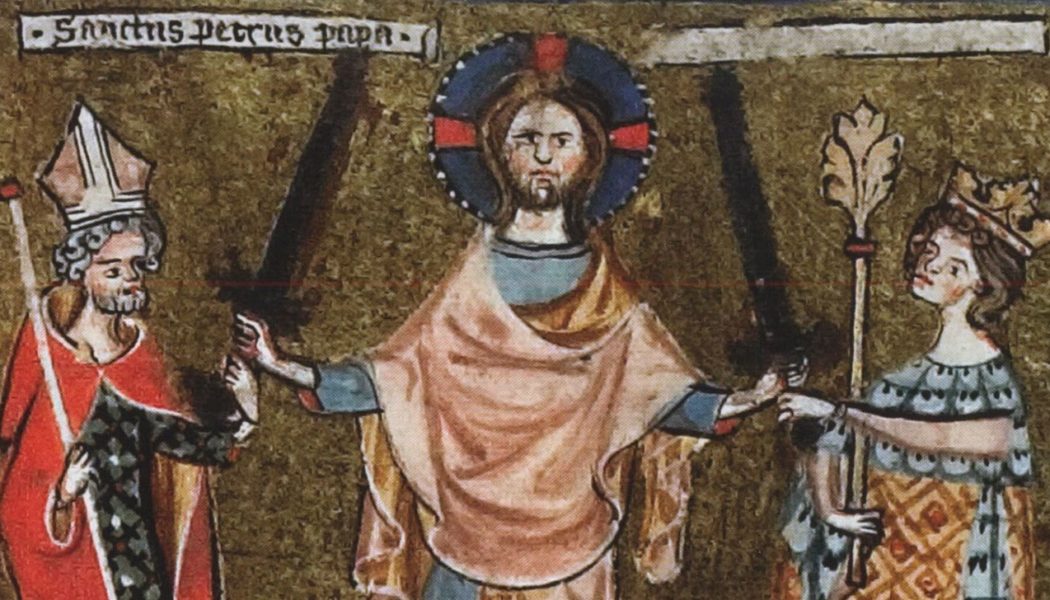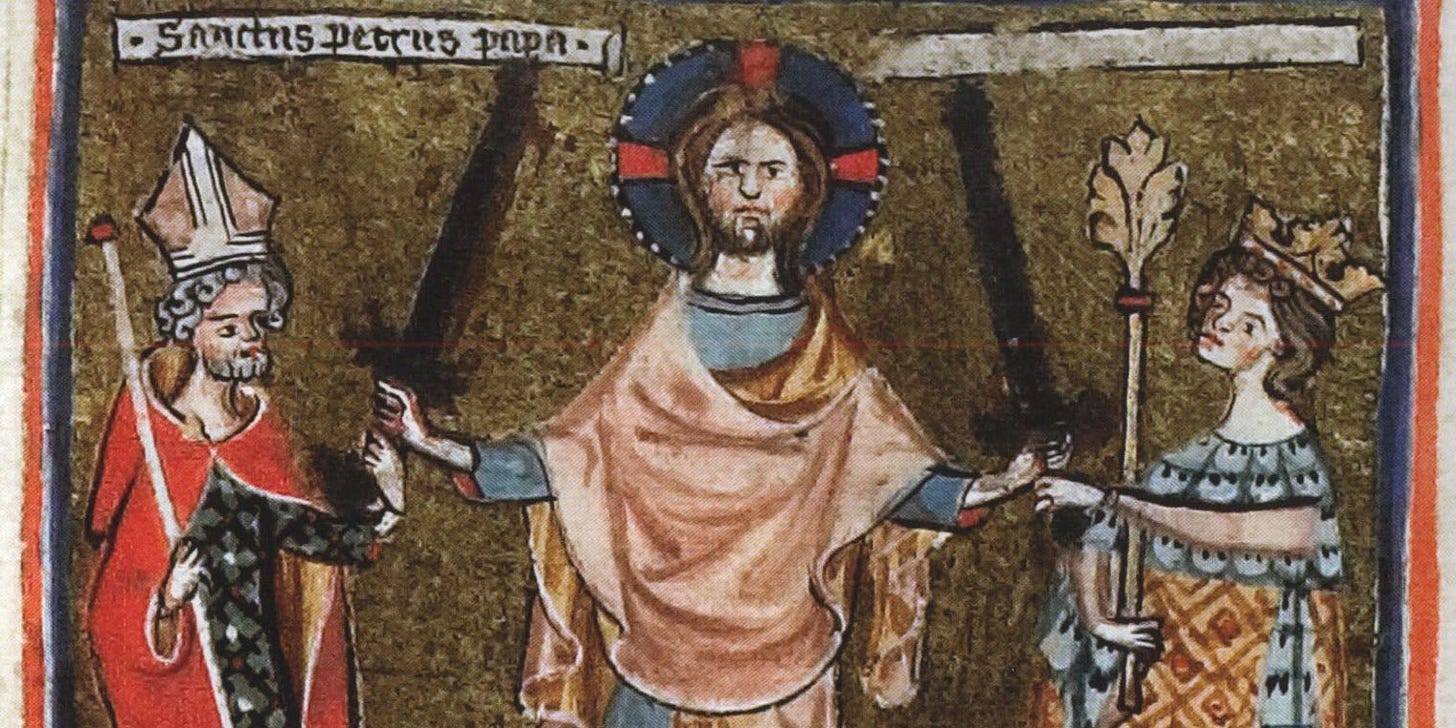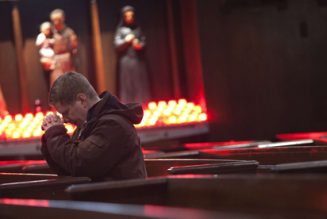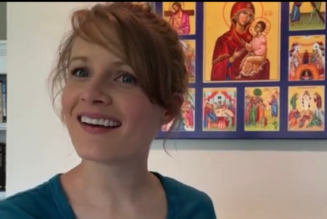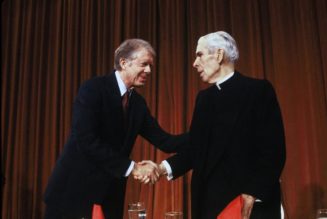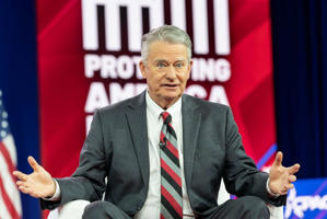One of the more talked about phenomena in American Catholicism in recent years has been the rising popularity of “integralism” among a section of Catholic commentators and academics.
The term can seem to mean different things to different people, and lead to calls for different, sometimes competing, visions of the relationships between faith and public affairs or Church and state.
So, what is integralism, anyway, and what does it mean for Catholics trying to pick their way through a period of political and social discord?
To answer that question, Charlie Camosy talked with Joseph Capizzi, executive director of the Institute for Human Ecology and an ordinary professor of moral theology at The Catholic University of America.
Capizzi has published widely on just war theory, bioethics, the history of moral theology, and political liberalism. He’s also worked as a research fellow at the VADM James B. Stockdale Center for Ethical Leadership, at the United States Naval Academy.
What is integralism, or neo-integralism? Who are the major players and what are their central claims?
The major figures seem to be primarily online, as I haven’t seen much of their work in standard theological journals. The two (English-speaking) who jump first to mind are Thomas Pink and Edmund Waldstein.
I take their central claim to be that, just as man has two ends, spiritual and temporal, and that man’s temporal end is ordered to his spiritual end, so must the juridical authorities of the world be hierarchically ordered: the temporal juridical authority to the spiritual juridical authority.
In other words, the state should be subordinate to the Church. Relatedly, then, any political order is deficient to the degree it fails to seek this hierarchization of juridical authorities, or denies the existence of the spiritual juridical authority. Thus, “liberalism” must be rejected if and when it denies such ordering — or the existence of the spiritual juridical authority.
Another important aspect of “integralism” has been justifiable resistance to the “spiritualizing” of the kingship of Christ; that is, to seeing the Christian assertion of Christ’s imperial claim over all creation as merely a spiritual reality, with no political implications.
One of the key problems with neo-integralism seems to be that its proponents sometimes speak as if power were a stand-alone, neutral thing, which must be ordered to the good. Perhaps they say more than this, but, to the extent they don’t, they distort the ontology of power, which can’t exist apart from end-seeking, and which exists only as a hypothetically necessary implication of legitimate authority for the sake of the common good.
What is the theological warrant for those claims, and how central are those warrants to the Catholic tradition?
Appeal is made to papal and theological authority to ground these claims. Texts often invoked include Boniface VIII’s Unam Sanctam (1302), Pius IX’s Quanta Cura, Leo XIII’s Libertas and Diuturnum (among others) and particular passages of Thomas Aquinas. I have not seen as much appeal made to the teaching of recent popes to ground the claims of integralism.
Theology is a science, and as a science it has first-order claims — the articles of faith — that are available to us only by grace. These articles of faith do have implications for all aspects of human life, but we must use reason to discern the nature of those implications. Doing so requires the exercise of prudence, which in turn involves sensitive discernment of the signs of the times.
Insofar as political institutions and practices are socially constructed and historically conditioned, the application of general principles to them can vary from age to age, even as the principles themselves don’t change. The political life of European states even in the 19th century — to say nothing of the 13th — is very different from that which we have now. Modern popes and bishops have taken all of this into account in their pastoral practice.
Sometimes, papal statements are read selectively rather than integrally in this matter. That is, context is left out of account, with the result that prudential applications are conflated with essential principles. But this distinction is crucial for explaining variations in teaching, and for showing that such variations have to do more with context-sensitive prudential application than with changes on the level general principle.
For example, Quanta Cura’s “Syllabus of Errors”lists more than two dozen errors on the part of governments in that era, most of which target state efforts to control or to tame the Church using the very temporal powers that the Church had allowed in the Middle Ages.
A century later, the declaration Dignitatis Humanae proposes very clearly that the liberty of the Church is the principium fundamentale (#13) of the teaching on religious liberty. For his part, Pope Leo XIII urged French Catholics to support the Third Republic, while Pius XI, who instituted the feast of Christ the King, signed a concordat with Mussolini. If we did not regard these as instances of prudential adaptations to different situations, we would be led to conclude the Church was self-contradictory from time to time and place to place. But the Church cannot contradict herself: “truth cannot contradict truth,” as St. John Paul II said.
It should be clear this mode of analysis pertains to all social doctrine.
Catholics who are sympathetic to integralism are also often particularly fond of John Paul II and Benedict XVI and yet neither of them advocated anything like integralism.
How does one explain that?
First, I’m not sure your assumption is correct: I’ve seen some deep suspicion of Popes St. John Paul II and Benedict among integralists, at least online.
But, accepting your premise and that the major theorists are concerned to support the magisterium, I can’t explain it except as representative of a common theological mistake made in approaching papal texts to which I alluded above.
Years ago, when St. John Paul issued Evangelium vitae (1995) and the Catechism of the Catholic Church texts on capital punishment, Steve Long argued in The Thomist that such statements have to be read within the context of the tradition; we must avoid reading the tradition against itself, whether we do so in a progressive spirit (“the Church is always learning!”) or in a nostalgic one (“would that things would be they way they were before!”). That insight applies here as well.
We must always read current and past statements within the context of the tradition. Failure to do so leads to folks appealing to popes against popes, and popes against theologians and so on. This is often done on the basis of a few texts and a few historical moments, and usually in ways that confirm our own judgments or dispositions. In other words, we make ourselves the measure of Church teaching!
The theological task and challenge is to read them as a continuous reflection on the demands of living the Gospel in the world; once again, the principles remain the same, even while the prudential application may vary. So, looking at say, Pope Leo XIII’s Libertas (1888) in the context of his Longinqua Oceani (1895) helps us see a line of continuity through them to the teachings of Popes Pius XI, John XXIII, JPII and Benedict, all of whom have offered both criticism and approval of the US constitutional arrangement. Likewise Popes John Paul, Benedict, and Francis have all criticized democracies that are morally free floating.
Worth mentioning here is Pope Benedict’s “hermeneutic of reform.” In an important address, Pope Benedict spoke of a “hermeneutic of reform” that, he says, must determine our approach to the Second Vatican Council. We should bring the hermeneutic to bear on our reading of Church tradition generally.
Benedict himself authorizes us to do so.
His reflections on this matter are an attempt to account for, and defend the judgment of, Pope Pius IX against the “radical individualism” of his century, while resituating them in the context of a more nuanced and appreciative relationship with modern states that, in Pope Benedict’s words, drew “from the great ethical sources opened by Christianity.”
Let me finish this question with some of Pope Benedict’s words from the address I’m referring to: “It is precisely in this combination of continuity and discontinuity at different levels that the very nature of true reform consists. In this process of innovation in continuity we must learn to understand more practically than before that the Church’s decisions on contingent matters – for example, certain practical forms of liberalism or a free interpretation of the Bible – should necessarily be contingent themselves, precisely because they refer to a specific reality that is changeable in itself.”
How much of the current movement toward integralism, at least as it has come to be known in US circles, can be explained by our particular moment in secular US politics?
It depends on what you mean by “US politics.” The new integralists are not simply the chaplains of Trumpism, as some of their critics have suggested. They are, in part, responding to what is arguably a widespread crisis in the status quo of US and European (or “Western”) politics, a crisis of which phenomena like Trump and Brexit are probably more symptoms than causes.
Big changes are happening all over the West: clearly the post-war era is over; it was limping along after 1989, but Sept 11, accelerated globalization, and the Great Recession have put paid to it. All this has left people searching. Indeed, one phenomenon noticed for decades has been near-universal ennui among the young who see into the meaninglessness of material culture.
Young people are always more open to radical alternatives and it is with them that neo-integralism has mainly gotten a foothold. That is to the credit of integralism: integralism offers not merely a diagnosis of our problems but an imaginative vision of a different sort of world than one that seems to be entropic.
This isn’t to say that I think integralism is the solution. It’s merely to point out that integralism is at least an attempt to respond to a problem that some critics of integralism either don’t see or reinterpret in ways that are not entirely accurate.
So far, we haven’t really discussed a group of integralists who are likely much better known outside of academic circles: Patrick Deneen, Sohrab Ahmari, Adrian Vermuile, Gladden Pappin, and (I think?) Matthew Schmitz, among others.
In general, though certainly not “chaplains of Trumpism”, they seem to be responding directly to the very new US political landscape created by the election of Donald Trump. Do you have a different view?
Proponents of the new integralism might disagree with the claim that they are responding to a “landscape created by the election of Donald Trump.” They might say that they are identifying and diagnosing a crisis of the entire liberal international order that’s been made manifest by phenomena or symptoms such as the election of Donald Trump, along with what they would probably regard as the overreaction to it on the part of the governing classes.
One can, of course, disagree with such an assessment of the political landscape. Nevertheless, it is an assessment that is probably closer to the one the new integralists themselves would make.
Let me repeat that I am not making a pitch for the new integralism. My point is rather that the new integralism is at least responding to a real crisis, in a deeply flawed manner. This is a crisis that any serious counter-proposal needs to take into account.
It’s not enough simply to denounce the new integralists as “right-wing,” especially since some of them have recently been trying to dialogue with some rather interesting representatives of the populist left.
In my personal opinion, the best diagnosis and responses to the problems we face would draw deeply on the recent papal magisterium, especially that of Popes Benedict and Francis.
Do you have a more helpful way for Catholics to think about their participation in the triumph of the Kingdom of God?
The fullness of the Catholic theological and philosophical traditions have ample resources for thinking about these questions. The popes and others are engaging them. Lay movements and new religious communities abound. Many of the predictions about the collapse of religiosity require revision in the face of these abundant responses to the ennui produced by our culture.
A young man can play Civilization or online poker only so long before he realizes life must have more to offer. And many are in fact realizing just that, and so are looking for an inspiring and radical plan of engagement with the world.
Every era has its faults, and we must follow St. Paul’s injunction to “test everything” by reference to the Gospel and our tradition. Earlier generations of American Catholics over-sold the harmony of Catholic moral principles and the American tradition of government. There are a number of serious problems in contemporary liberal societies; what is needed is careful, patient exploration and criticism of these things.
Wholesale rejection of our institutions is unlikely to result in anything but alienation — though, to be fair, many of the new integralists are not calling for that. One can regard this as a closed loop: alienation producing more alienation. Catholicism is so much more invigorating than that.
Look at the energy coming from Pope Francis himself. His pontificate is marked by the recognition of the limitations of liberal culture, an insight into the alienation and ennui experienced by young people, and his call to them to step outside of themselves into the energizing discomfort of the “periphery.”
The periphery in Pope Francis’s speech is no abstraction, but a vista from which to see things with greater clarity and a place where we encounter the poor. In contrast to a “center” he views as a “comfort zone” of self-absorption where nothing grows, no life breaks through, he celebrates a periphery where we find opportunities for witness and evangelization.
The triumph of the Kingdom of God will be born by each of us “ready to put his or her whole life on the line, even to accepting martyrdom, in bearing witness to Jesus Christ, [and for whom] the goal is not to make enemies but to see God’s word accepted and its capacity for liberation and renewal revealed.” (EG no. 24)
What could be more exciting than choosing to be part of that?
Join Our Telegram Group : Salvation & Prosperity
